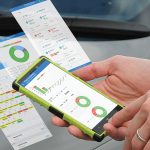The road to a data-driven future
The road to a data-driven future
Is the heavy-duty trucking, freight and transport industry doing the right things to set itself on the road to a future which is economically, politically, technologically and environmentally sustainable? EMMANUEL MIGNOT, President and MD of Belgian Shell, says the answer is yes. But there’s a proviso…
Over the last ten years, the sector has undergone tremendous change. Developments such as telematics and automated road-side payment infrastructure have greatly simplified fleet management. They’ve also helped managers cut fuel bills, reduce emissions and make their drivers safer.
At the same time, it’s become clear that to manage the energy transition, fleets will have to introduce a range of new and innovative fuels, alongside diesel, and significantly improve the emissions efficiency of the diesel vehicles they continue to use. Major markets, including India, the European Union and China, have all either announced or mooted stringent new standards or even the phasing out of diesel heavy-duty vehicles.
The challenge is to integrate a whole range of emerging technologies – from new fuels and powertrain types to telematics, Internet of Things (IoT) sensors and AI-driven predictive fleet-management software – to create a fleet that is efficient, cost-effective and ready for the future. And the only way to do that is to embrace data.
The power of data
The average modern car already has over 200 connected data points, notes a research report by analysts Frost & Sullivan published in 2018, “Automotive Data Monetization Pricing and Business Models”.
Properly monitored, using IoT sensors feeding data back to a fleet-management solution, these data points can yield:
• Warnings of impending component or sub-system failures, which can be used to schedule pre-emptive maintenance, thus cutting downtime.
• Information on driving styles that can be used to coach drivers to be safer and more fuel efficient.
• Route data, which fleet managers can use to optimise journeys for the best combination of fuel, toll and time efficiency.
• The ability to match vehicles to the nearest load in real-time, helping to cut empty miles and idle time — increasing efficiency and reducing cost.
Frost & Sullivan’s analysis shows that effective use of data and data-driven technologies can help fleet managers increase their productivity by up to 15%, reduce vehicle idle time by up to 30% and cut fuel expenses by as much as 25%.
To take advantage of these technologies — which are available today — fleet managers need to work with the right technologies, the right systems and the right partners to capture this data and then turn it into actionable insights.
Managing the smart fleet of the future
The innovations we’ve seen today are only the start. Tomorrow, we can expect fleets to run using “smart contracts”, built on technologies such as Blockchain. Pulling data from telematics, the fleet-management solution will work out in advance what the vehicle’s optimum route should be, and identify locations where it could stop for the night, refuel, undertake necessary maintenance and so on.
While the driver is still on the road, the fleet-management solution will enter into automated negotiations with all the truck-stops identified. Based on pre-populated bidding information, it will enter into an auction for the services for which the driver and vehicle are required.
While the truck is still on the move, the system will communicate with the different service providers, comparing their prices and dynamically factoring in other variables such as traffic congestion on each route, the distance and the price of fuel to each vendor. All this information is used by the automated-bidding system to get the best deal on the basis of price and efficiency.
Add systems such as load-brokerage platforms into the mix. Then factor in the arrival of new fuel sources, and the expected ability to use smart contracts to charge electric vehicles on the go, and it becomes clear that the future of fleet management will look very different to the way it looks today.
• Want to do more reading on the subject? You can download Shell’s Driven by Data report here.

Published by
Focus on Transport
focusmagsa




